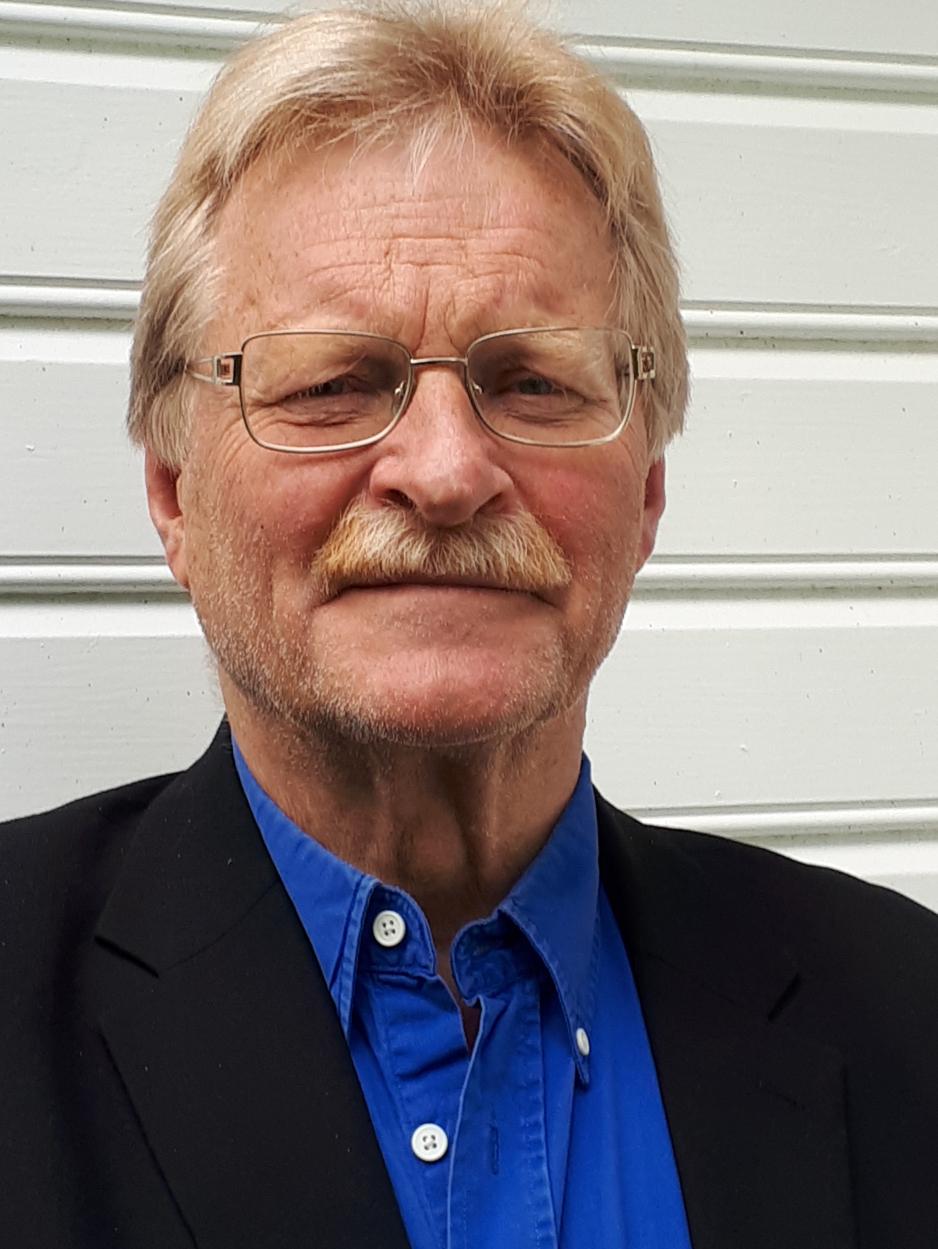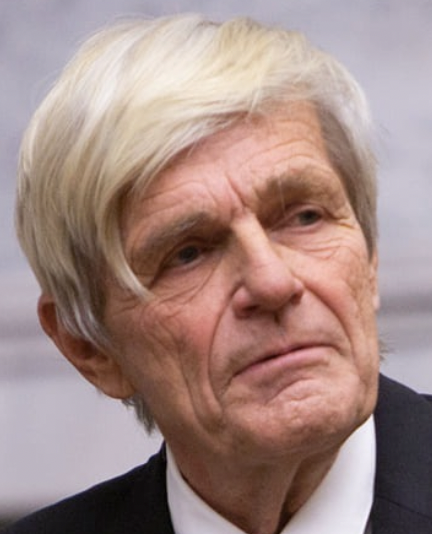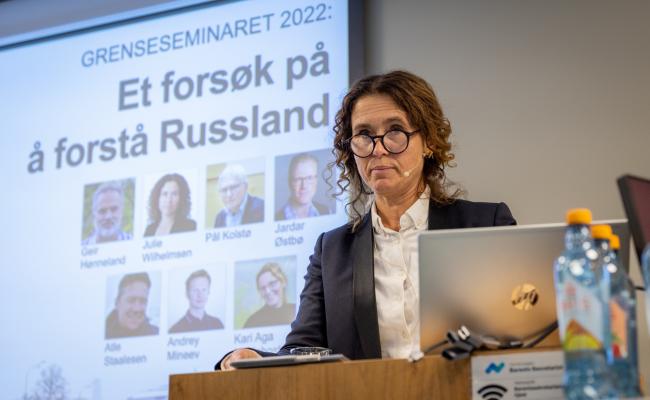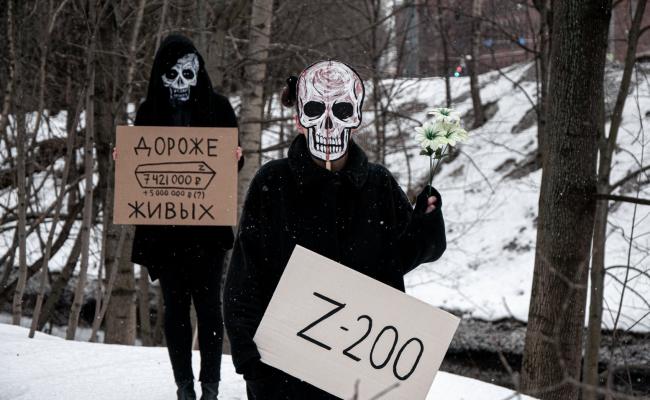Norwegian Russia Diplomats: The Barents Cooperation Has Not Been In Vain
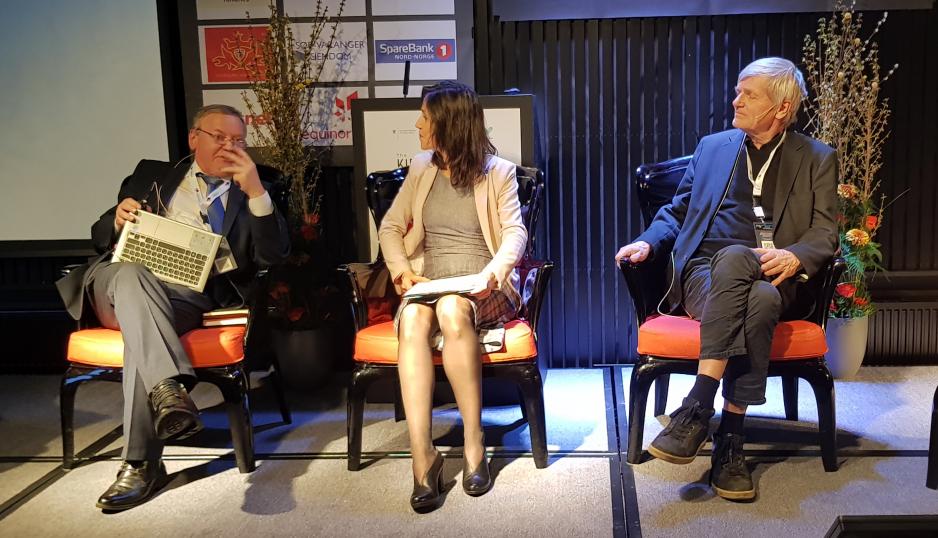
The Norwegian former diplomat Sverre Jervell (right) worked extensively on the development of the Barents Initiative. Here, Jervell reminisces about the beginning of the collaboration at the Kirkenes Conference 2019 with Anatolij Smirnov, Russia's first consul in Kirkenes, and conference host Siri Lill Mannes. He recently attended an event marking 30 years of Barents cooperation in the border city. (Photo: Arne O. Holm)
The Barents cooperation has turned 30 years. This interaction – especially the people-to-people dimension – has created a less tense and more constructive neighborship in the High North and this is not zeroed out because of the Ukraine War, believes veterans of the Norwegian MFA.
"Through more than two decades, the Barents cooperation contributed to developing dialogue, trust, and interaction in the North. It helped create an atmosphere for solving important questions about Norway and Russia, including the agreement on the maritime delimitation in the Barents Sea which resulted in the 2010 agreement."
That is said by Øyvind Nordsletten, who has extensive experience within Norwegian Russia diplomacy as both ambassador in Moscow and Consulate General in Murmansk.
From the 1990s, Norsletten helped initiate and follow up the cooperation in the Barents region.
That Russia has changed so much that the cooperation had to be put on hold in March 2022, does not deprive the Barents cooperation of the beneficial contribution it has made, he points out.
"In addition, the cooperation in the Barents region has always been about something more than building bridges between Norway and Russia especially. It has also been about connecting northern provinces in several countries closer together, with the inclusion of Finland and Sweden as 'core countries'. Cooperation between Nordic countries has gained extra inspiration and input through the Barents cooperation," says the retired diplomat.
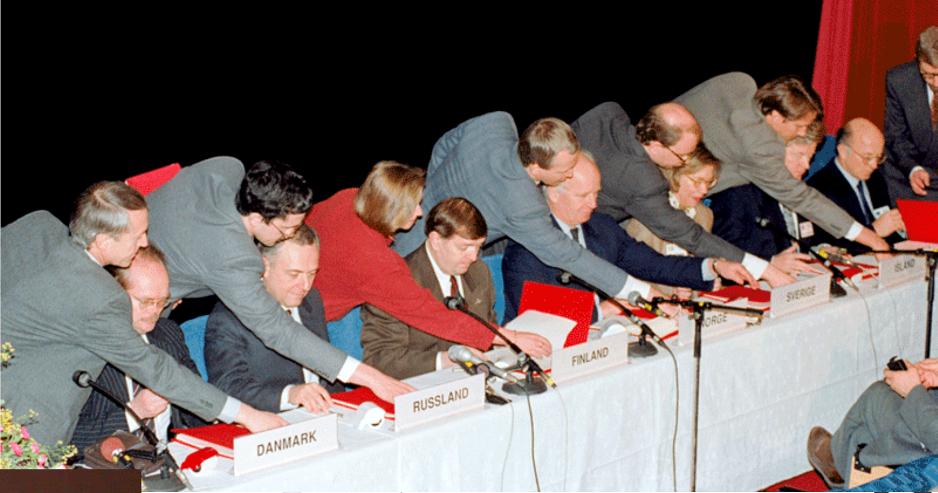
Norwegian MFA Thorvald Stoltenberg and his Russian colleague Andrei Kozyrev can be described as the Barents cooperation's 'father' and 'birth assistant'. Early in 1993, they gave the cooperation life by signing the Kirkenes declaration with MFA's from the other Nordic countries and the EU Commission's ambassador in Norway. (Press photo)
Disputed
On the 11th of January 1993, the Kirkenes Declaration – the Barents cooperation's foundation document – was adopted by Russia, Norway, Finland, Sweden, Denmark, Iceland, and the EU commission.
Through this new framework for interaction, bridges were to be built over dividing lines in the militarized north – aiming for stability, peace, and joint projects.
Currently, three decades later, some believe that the cooperation in the Barents region has been a failure – with reference to Russia's authoritarian approach towards its civil society, its warfare against Ukraine, and its stings against the West.
However, the understanding of the Barents cooperation as a successful format still holds up. The long-standing collaboration – both between states, regional units, and people – has been fruitful in ways that do not fade away because of the war, Sverre Jervell also believes.
Early in the 1990s, he worked in the Norwegian MFA's Department for Planning and suggested the Barents idea for the Minister of Foreign Affairs Thorvald Stoltenberg. They worked closely on the further development of the initiative.
A few weeks ago, both Jervell and Nordsletten participated in the marking of the now 30-year-long cooperation in Kirkenes.
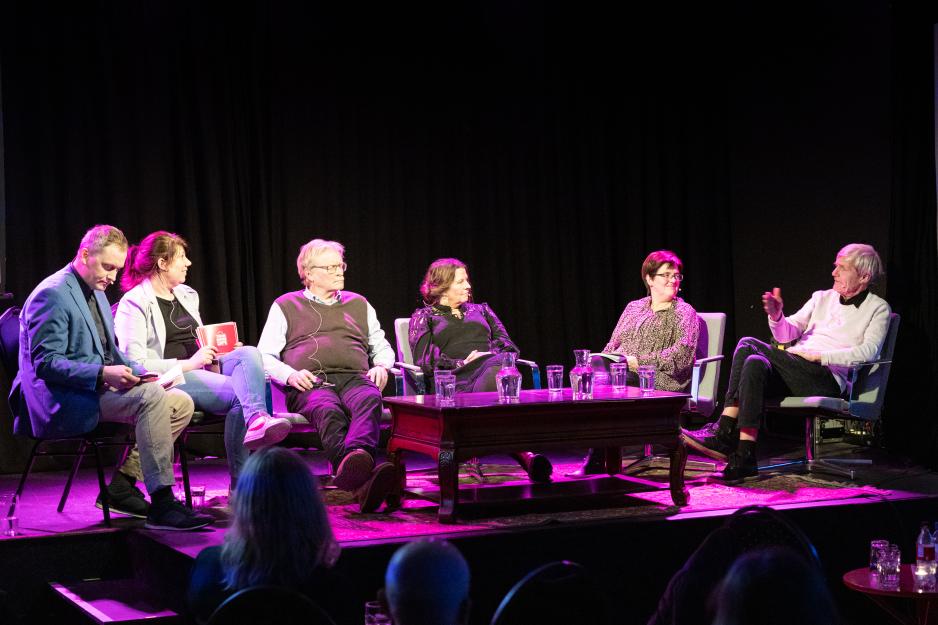
Three decades of the Barents cooperation was recognized in Kirkenes with discussions around what has been and what may come. From the left: Hosts Evgeny Goman, Pikene på Broen producer, and Marit Jacobsen, Deputy Head of the Barents Secretariat; former diplomat Øyvind Nordsletten, the Samovar Theatre founder Bente S. Andersen, NORCE researcher Vigdis Nygaard, and former diplomat Sverre Jervell. (Photo: Ole-Tommy Pedersen/the Barents Secretariat).
Innovation
"Firstly, it is important that the Barents cooperation was born after the fall of the Berlin Wall in 1989. This made the idea of cooperation in the North gain support in Moscow," says Jervell.
With the demise of die Mauer – which symbolized a divided Europe in the years of the Cold War – came a new era of profound changes and room for further foreign policy rethinking.
"The Barents cooperation became Europe's most important experiment with people-to-people cooperation across the east-west border and between two different political systems. This was unique and also bore outstanding results," says the Barents veteran and continues:
"The people-to-people dimension has been especially successful. Thousands of people in the North, especially Norwegians and Russians, have gained a new perspective on their neighbors and the possibilities for border-crossing interaction. Through this, a large network of contacts has been created, which may be vitalized again in the future. For a day will come when the war in Ukraine will end and we must hope that this also leads to the fall of Putin."
The Russian MFA Andrei Kozyrev's journey before signing the Kirkenes Declaration
"On his way to Kirkenes, Kozyrev conducted a remarkable detour. On the 9th of January 1993, he visited the Northern Fleet in Murmansk and Severomorsk. To the officer corps, he emphasized that the notion of a world split in two had expired. Russia had no constant enemies, he stated, only constant interests. These interests would best be promoted in cooperation and partnership with the outside world. He said it was in exactly this regard that the Russian delegation, with participation from Murmansk and Arkhangelsk Oblasts, traveled to the Barents cooperation's founding conference in Kirkenes. As if to highlight that the military differences of the Cold War were over, Kozyrev visited the Norwegian Air Force's station in Bodø the day after. Here he presented a copy of the Soviet fighter plane MIG-15 to the National Norwegian Aviation Museum."
(Excerpt from the history book Neighbors in fear and expectation: Norway and Russia 1917-2014.)
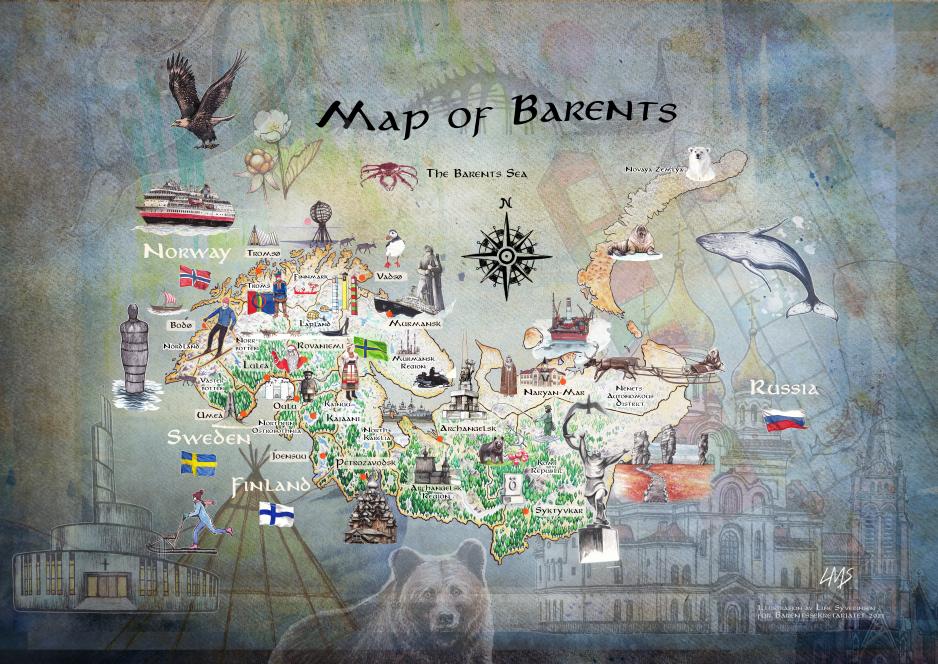
Map of the Barents region created by artist Line Marie Syverinsen for the Norwegian Barents Secretariat in 2021. (Illustration: Line Marie Syverinsen/the Norwegian Barents Secretariat).
Challenges, yes, indeed
Jervell endorses the Barents cooperation, but considers it impossible to continue the cooperation as long as the Ukraine War continues. However, the difficulties started before the Russian attack on its neighboring country, he states.
He especially points to a Russian law of 2012 that non-governmental organizations which receive money from other countries, must register as "foreign agents", with an accompanying requirement to report certain information and to make public their status as this type of "agent". The law has been extended several times, most recently in December 2022, with a particular focus on Western influence. A number of organizations and individuals within the civil society and media have been entered into an agent register.
"The cooperation has been, from my perspective, very successful. Putin's policy of labeling various organizations and actors as "foreign agents" did, however, lead to serious problems for the border-crossing cooperation in the North. The law is an expression of Putin's fear that unrest and rebellion will make their way into Russia and affect his position."
"Then came the invasion of Ukraine and the Barents cooperation had to be put on hold. Anything else would be unthinkable. However, it will come a day when it will be resumed. We just do not know when," Jervell adds.
Then everything was punctured by the attack on Ukraine.
A new attempt
Continuing, Jervell talks about a specific attempt to reactivate the Barents region cooperation before the war started:
"It was an initiative originating in the Norwegian-German Willy Brandt Foundation and built on Russia's MFA Lavrov's statements in Tromsø in 2021. A new Kirkenes meeting between the MFA's of the Barents region was suggested, where one would try for a new beginning under the condition that the law about 'foreign agents' was not to affect the Barents cooperation. There was political will in Oslo and Berlin to present such a plan for the Russians."
"Lavrov made some positive signals, but these had to be translated into a concrete proposal. Then everything was punctured by the attack on Ukraine," says Jervell.
The aforementioned foundation bears the name of the West-German Chancellor Willy Brandt, who received the peace prize for his eastern policy (Ostpolitik) focusing on dialogue and change through rapprochement.
High North News reported on Lavrov's statements in 2021 at the Kirkenes Conference and the Barents Euro-Arctic Council's ministerial meeting in Tromsø.
Norway's MFA Anniken Huitfeldt and Russia's MFA Sergej Lavrov during bilateral conversations on the sideline of the Barents Euro-Arctic Council's ministerial meeting in Tromsø in the fall of 2021. (Photo: Hilde-Gunn Bye)
Purpose and meaning
A central point for some of the critics who believe that the Barents cooperation has failed, is that it has not contributed to the democratization of Russia. This view also meets resistance from the diplomats.
"System change in Russia has not been the aim of the Barents cooperation. No basis can be found for this in any official statements. If Stoltenberg had believed this to be an aim in 1993, it would be politically impossible for the Russians to participate in this project," says Jervell.
"Per contra, the aim was to establish cooperation between countries with different governance systems and traditions. Russia has a completely different history. The Russians did not have the Enlightenment and did not develop the same view on the individual and on human rights as we did. The Barents initiative was an attempt to show that it is possible to cooperate across great cultural and historical differences. Neighbors must be able to talk together and collaborate although they have different interests and ways of thinking," he continues.
"This was meant to be bridge-building across what had essentially been closed borders; with contact and interaction on multiple levels – not just the official political one. There were historical references to the Pomor Trade (Russian-Norwegian trade, ed.note) and a wide border-crossing contact network in the North until 1917. In the 90s, one wanted to develop a normal neighboring relationship with Russia through contact and interaction – and create a new Europe where people live together in peace and trust. That was the vision, but now we must simply state that it did not turn out that way in reality," adds Nordsletten.
Closing all doors for dialogue would be a mistake.
Looking toward the future
Jervell strongly believes that there will be a new spring for Barents cooperation.
"Throughout history, Russia has alternated between openness and closedness towards the West. A new Russian turn towards the West will come sooner or later, but not as long as there is a war in Ukraine and probably not under Putin's rule," he believes.
Nordsletten is more uncertain about the future of the Barents format.
"Today, we just have to state that there is no way to continue the Barents cooperation in its previous form. If and when it will be able to resume is impossible to say. But from my perspective, one must never give up the thought of establishing as rational a relationship as possible to the great neighbor in the North," he says and goes on:
"We must have no illusions that it will be easy and we are probably facing a long period of strong tension between Russia and the West. However, we must keep believing that change will come and not just declare that all is lost forever."

The idea was that the people in the North were going to create the Barents cooperation's contents and be its central driving force – as opposed to the politicians in the capitals, emphasized Thorvald Stoltenberg. Here are some of the region's young citizens during the opening ceremony of the Barents Winter Games in 2018 in Lulelå, Northern Sweden. (Photo: Jonas Karlsbakk/the Barents Secretariat)
The links between people
The Barents veterans also speak up for preserving the people-to-people cooperation as far as possible.
"When Thorvald Stoltenberg launched the Barents initiative, he emphasized that the cooperation was to involve people in the North and that it would be a frame for a wide specter of border-crossing activities. From my perspective, we should not burn all bridges, but continue having contact with the Russian side where it is possible – not least within culture and interpersonal relationships," says Nordsletten.
"Big politics unfolds on its own level – and there is much that we wish was radically different after Russia's brutal war against its neighboring country Ukraine – but closing all doors for dialogue with the Russians would be a mistake," he believes.
People have experienced that cooperation is possible. They will not forget that lesson easily.
Keeping the embers burning
Jervell also supports this approach.
"Now we have to preserve the cooperation structures – keep the embers burning – by maintaining as many practical contacts as possible. The Barents cooperation's biggest asset is exactly the thousands of people on the Norwegian and Russian sides that have met and discussed joint projects. They have experienced that cooperation is possible. They will not forget that lesson easily," he says.
Numbers from the 'normal year' of 2019 (before the pandemic and the war) are illustrative: 30 000 Norwegians and Russian participated in projects supported by the Norwegian Barents secretariat.
"In sum: The Barents cooperation was valuable while it lasted. Now it belongs to the past. It will have to be a pious hope for its future. We must never give up the belief that it could happen, but soberly and without illusions face the fact that it will require a different and better world," says Nordsletten.
Facts about the Barents cooperation
– The Barents cooperation is a formalized collaboration primarily between Russia, Norway, Finland, and Sweden – designed to promote stability and sustainable development in a region that was characterized by military tension during the Cold War.
– The cooperation was established through the Kirkenes Declaration in 1993, stemming from a top-political process led by the MFA's in Norway and Russia – and a regional process with initiatives for business and cultural cooperation between northern counties in the two states. These two levels structure the cooperation.
– The Barents Euro-Arctic Council is the format for intergovernmental cooperation – which also includes Denmark, Iceland, and the EU as members. Nine countries have observer status. An international Barents Secretariat, established in Kirkenes in 2008, provides administrative assistance.
– The Barents Regional Council gathers 13 regional units in the four 'core countries' and representatives from the three indigenous peoples in the region – the Sàmi, Nenets, and Veps.
– There are several working groups under the council bodies, i.a. for health and social issues, environment, education and research, culture, indigenous affairs, and business.
– The Norwegian Barents Secretariat in Kirkenes has since 1993 supported Norwegian-Russian collaborations in the region through funding, sharing of knowledge, and networking.
– In March of 2022, all activities with public Russia within the Barents cooperation were suspended. The people-to-people cooperation with independent Russian actors remains. On the 1st of February, the Norwegian Barents Secretariat closes its three local offices in Russia.
Also read
This article was originally published in Norwegian and has been translated by Birgitte Annie Molid Martinussen.


